7: Human Rights
“O Mankind! We Have Created You From A Male And A Female, And Have Made You Nations And Tribes That You May Know One Another. Verily The Most Honorable Of You In The Sight Of Allah, Is The Most Pious. Verily Allah Is All-Knower, All-Aware”. Quran, 49:13 The Inner Apartments (Al-Hujurát)
Freedom, Justice & Protection
“No compulsion” in Islam
Muhammad proclaimed himself as a messenger Of God. He received a Divine Message to humanity and struggled to convey it to all people but he did not force anyone to accept it. He recited the Quran which confirms the freedom of belief and freedom of choice for all people.
“And had your Lord willed, all people in the earth would have believed (all of them) together. So will you (Muhammad) compel or force people until they become believers?” Quran, 10:99
“There is no compulsion in religion, truth (the right path) has become distinct from error (wrong path), and whoever rejects evil and believes in God has grasped the most trustworthy hand-hold that never breaks. And God is All-Hearer All-Knower”. Quran, 2:256
Morality and equality of all races
In Islam, all people are considered equal under law by reason of their being members of the human race. Piety and excellence of moral character are the only criteria for individual superiority in the eyes of God. Muhammad put it in these words:
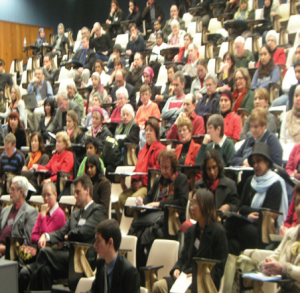
”Your Lord is One. All humankind are from Adam and Adam was created from dust. An Arab has no superiority over a non-Arab nor does a non-Arab have any superiority over an Arab except by piety (piety motivates good deeds).” (Musnad Ahmad 10/5586, 23972)
Muhammad encouraged freeing slaves and introduced Islamic regulations to eliminate slavery
Slavery existed before Muhammad’s time. In fact, it was part of many social systems in the world. Slaves were considered as assets and part of people’s wealth. Since Islam protects people’s wealth and property, slavery was gradually abandoned.
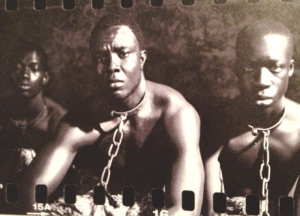
In the early days of Islam, abusing and mistreating a slave was considered a sin that required repentance to God by releasing the slave free.2In addition, repentance from violations of many Islamic rules required releasing slaves or buying a slave from someone and freeing him or her. This continued until slavery was fully abolished.
Muhammad encouraged believers to release slaves for the sake of God. On one occasion, Muhammad saw a person called “Abu Mas’ud Al-Badri” hitting and lashing his slave. Muhammad said to him firmly:
“You should know that God is more able and has more power over you than your power over this slave.” Abu Mas’ud cooled down and said to Muhammad in an apologetic language:” I will release him for the sake of God.” Muhammad said to him: ” If you don’t do that, the Hellfire will touch your face.”3 (Sahih Muslim 5/91, 1659)

Protection and security of people
Addressing more than 100,000 people, Muhammad said in his last sermon:
“O people, believers are but brothers. No one may take his brother’s property without his full consent. Have I delivered the Message? O Allah, my Lord, be my witness. Never go back smiting each other’s necks. Verily, I have left among you that which if you take, you will never stray after me: the Book of God and my example. Have I delivered the Message? O Allah my Lord, be my witness.” (Al-Hakim, 1/93, 317. Al-Bayhaqi, 6/96, 11640)
All people stand on equal footing before the law
Prophet Muhammad introduced and taught people Shariah, i..e. God’s Law that regulates people’s lives and controls their dealings and transactions. He emphasized that all people should respect the law and the offenders must be punished regardless of their social standing. When the law is applied justly, all people enjoy justice and security.
The Prophet made clear that no one is above the law including his own relatives. For example, theft and robbery are an attack on people’s properties regardless of their race and social class. Muhammad stated clearly that he would punish his beloved daughter Fatima if she stole from anyone.4
Judge with justice; the story of To’mah and the Jewish Man
On one occasion, an Arab man called To’mah Bin Ubayriq stole a metal shield which was part of a suit of armour and hid it in the house of his Jewish friend. The Jewish person was accused of stealing the metal shield but he denied the charge and accused To’mah.
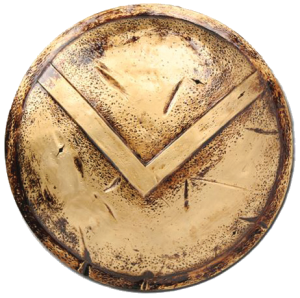
As the offender was not known yet, many Arab Muslims sympathized with To’mah and tried to influence Muhammad’s opinion to turn the case against the Jewish man but Islamic justice prevailed. To’mah was proved guilty and the Jewish man was proved to be innocent. In this context, a verse was revealed in the Quran asserting justice: (Al- Hakim, 4/385, 8256. Tirmithi, 5/128, 3036)
“Surely we have sent down to you the Book with truth so that you judge between people according to what God has shown you(taught you justice). So don’t be a pleader on behalf of those who betray their trust.” Quran, 4:105
Women’s rights and obligations
Muhammad reaffirmed protection of women’s rights in his farewell address. He said:
“O people, it is true that you have certain rights with regard to your women but they also have rights over you.” “Remember that you have taken them as your wives only under God’s trust and with His permission. Do treat your women well and be kid to them for they are your partners and committed helpers.” (Sahih A-Bukhari, 6/27. Muslim, 4/178, 1468)
Protection of orphan’s rights

Muhammad conveyed God’s Commandments in relation to orphans. The Quran commands Muslims to protect orphan’s rights and to treat them with kindness and justice.
“Indeed those who consume the wealth (property) of the orphans unjustly are only consuming fire into their bellies. For they shall roast in Blaze (burn in Hellfire).” Quran, 4:10
Muhammad said:
“I And The Person Who Looks After An Orphan Will Be In Paradise Like This, Putting His Index And Middle Fingers Together.”5 (Sahih Al-Bukhari, 7/53, 5304)
Deliver trusts to those entitled to them

Muhammad was asked to lead a funeral prayer for a person, but he first asked his companions: “Did this man borrow any money or have in his possession any trusts that belong to others?” They said ” “Yes”. So Muhammad asked them first to deliver the trusts to those entitled to them and then he would pray for him.
“Allah Commands you to deliver (render back) trusts (duties) to those entitled to them, and when you judge between people, to judge with justice. How excellent what Allah exhorts (admonishes, cautions) you; surely Allah is All- Hearing, All-Seeing.” Quran 4:58
Protection of heirs rights
According to Islamic law, when someone dies, his or her closest family members are entitled to get stipulated portions of the inheritance (wealth and property of a deceased person). Islam does not allow a person to allocate in the will more than one third of his / her wealth for charity or donation purposes. This is to protect the inheritors’ rights and ensure fair distribution of the inheritance among all of them.
Muhammad visited one of his companions who recovered from an illness. The man said he owned a great wealth and he had only one daughter as an heir (inheritor). He asked Muhammad if he could leave two-thirds of his wealth as charity. Muhammad said: “No”. The man asked about the half. Muhammad said: “No”. The man asked about one-third? Muhammad said: “One-third (agreeing) and one third is a lot. To leave your heir(s) wealthy is better than leaving them poor asking for help.”
No usury in Islam
Muhammad said: “God has forbidden you to take usury, therefore all interest obligations shall henceforth be waived. Your capital is yours to keep. You will neither inflict nor suffer any inequity. Allah has judged that there shall be no usury (interest).
“Those who charge usury are in the same position as those controlled by the devil’s influence. This is because they claim that usury is the same as trade. However, God permits trade, and prohibits usury.” Quran, 2:275
Honor killing and bloodshed Is forbidden

Muhammad abolished blood vengeance (revenge or retaliation) and vendetta (blood feud or dispute). At his farewell address he declared:
“Every right arising out of homicide (murder) in pre-Islamic days is henceforth waived and the first such right that I waive is that arising from the murder of Rabi’ah (a relative of Muhammad).” (Tirmithi, 5/167, 3087. Ibn-Majah, 4/243, 3055)
Deliberate murder and killing by mistake
A deliberate murder is subject to retaliation in kind, the killer must be sentenced.
But, whoever kills someone by mistake and causes accidental death must pay compensation to the family of the killed person. At the time of Muhammad, the indemnity was one hundred camels. Muhammad told his people that whoever asks for more than this figure is a person of the era of ignorance.
Fighting in Islam
Muhammad taught his followers to be assertive with their enemies, neither submissive nor aggressive. He was inevitably involved in battle fields. Muhammad set rules and ethics of engagement with enemies in battles and dealing with prisoners of war.
He taught Muslims not to fight civilians and not to attack or kill children or women or elders. He asked them not to destroy the environment or damage trees.
DO NOT KILLcivilians, children,women and elders
DO NOT DESTROYenvironment anddo not cut trees
He always reminded them that their involvement in battles should be on assertive ground and for the sake of God who does not like transgressors. Verse 190, Chapter 2 of the Quran sets the basic rule for fighting enemies and aggressors. It clearly states:
“And fight for the sake of Allah those who fight you and don’t transgress the limits. Verily, Allah does not like transgressors.”
Muhammad considered committing suicide a major sin
Muhammad put it in these words:
“Whoever kills him/ herself with a piece of metal, he/she will be resurrected on the Day of Judgment holding the same piece of metal and killing him/herself continuously in the hellfire forever, and whoever kills him /herself with a poison, he/she will be resurrected holding the same poison and swallowing it continuously in the hellfire forever, and whoever kills himself/herself by throwing himself/herself from a high place such as a mountain, he or she will do the same in the hellfire forever.” 6
Sanctity and inviolability of human lives
Because God is the creator of life and the only controller of it, he owns every creature’s life. God states in the Quran in relation to the first murder incident in the history when Cain, the son of Adam, killed his brother Abel:
“For that we decreed for the children of Israel that whosoever murders a human-being who had not committed murder or horrendous crimes (mischief on the earth), it shall be as if he had murdered all the people, and whosoever saves the life of a human-being, it shall be as if he had saved the life of all humankind.” Quran, 5:32

Muhammad condemned violence
Muhammad never used violence as a tool to convey God’s message or impose God’s religion. Although he established an Islamic state in Madinah, he never used the small Muslim community who remained in Makkah to create trouble or assassinate his enemies. In fact, he asked his followers to respect the social order of the society they lived in.
Muhammad taught believers that whenever and wherever gentleness or kindness is used in a matter, it will add value to it and will bring good results. He also taught that roughness and indelicate behaviors will spoil every matter. Narrated by Muslim
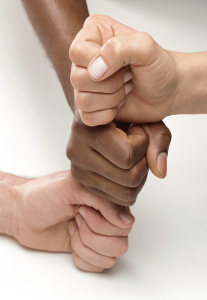

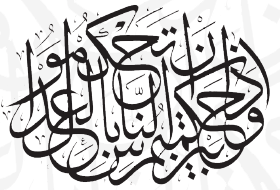
Islamic calligraphy produced by the Turkish calligrapher Hassan Chelebi for a verse in the Quran. God says to people: “When you judge between people you judge with justice.” The Quran, 4:58.

Islamic calligraphy produced by the Egyptian calligrapher Isaam Abdul Fattah for a verse in the Quran. God says to people: “And no bearer of burdens will bear the burden of another (at the Day of Judgement).” The Quran, 17:15.
ENDNOTES
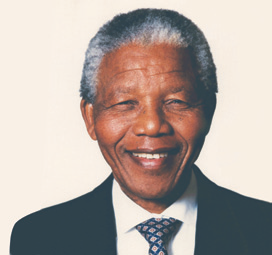
- Nelson Mandela(the first president of democratic South Africa) is a great example for the struggle against apartheid and discrimination among people of different races. South Africa became a country in which all people live together as one nation united in their diversity. The Quran teachings confirm the fact that God created humankind from different nations and tribes so that they may know one another. A white man has no superiority over a non-white man except by piety (and vice versa). “Verily the most honorable among you in the sight of Allah, is the most pious. Verily Allah is All-Knower, All-Aware.” The Quran 49:13
- Riyadh al-Salihin (1603/4), (1605/6)
- Prophet Muhammad indicated that at the Day of Judgment, God will be the foe for those who hire workers and don’t pay them their wages. Prophet Muhammad emphasized that wages must be paid for workers before their sweat dries. Wages cannot be delayed and must be paid immediately after finishing work.
- For more information about Islamic law please see: http://www.islamreligion.com/category/110/ http://www.islamhouse.com
- Sahih Al-Bukhari (34/8)
- Sahih Al-Bukhari (5778) and Sahih Muslim (109)
Artistic design from the word “Muhammad” in Arabic.Courtesy of Farid Al-Ali.